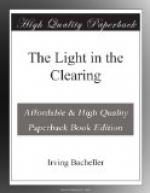“I am sure he will let you know, and, by the way, I have heard from another friend o’ yours, my lad. Ye’re a lucky one to have so many friends—sure ye are. Here, I’ll show ye the letter. There’s no reason why I shouldn’t. Ye will know its writer, probably. I do not.”
So saying he handed me this letter:
“CANTERBURY, VT.,
June
1.
“DEAR SIR—I am interested in the boy Barton Baynes. Good words about him have been flying around like pigeons. When school is out I would like to hear from you, what is the record? What do you think of the soul in him? What kind of work is best for it? If you will let me maybe I can help the plans of God a little. That is my business and yours. Thanking you for reading this, I am, as ever,
“God’s humble servant,
KATE FULLERTON.”
“Why, this is the writing of the Silent Woman,” I said before I had read the letter half through.
“Rovin’ Kate?”
“Roving Kate; I never knew her other name, but I saw her handwriting long ago.”
“But look—this is a neatly written, well-worded letter an’ the sheet is as white and clean as the new snow. Uncanny woman! They say she carries the power o’ God in her right hand. So do all the wronged. I tell ye, lad, there’s only one thing in the world that’s sacred.”
I turned to him with a look of inquiry and asked:
“What is it?”
“The one and only miracle we know-the gate o’ birth through which comes human life and the lips commanding our love and speaking the wisdom of childhood. Show me how a man treats women an’ I’ll tell ye what he amounts to. There’s the test that shows whether he’s a man or a spaniel dog.”
There was a little moment of silence then—how well I remember it! The schoolmaster broke the silence by adding:
“Well ye know, lad, I think the greatest thing that Jesus Christ did was showing to a wicked world the sanctity o’ motherhood.”
That, I think, was the last lesson in the school year. Just beyond us I could see the slant of Bowman’s Hill. What an amount of pains they gave those days to the building of character! It will seem curious and perhaps even wearisome now, but it must show here if I am to hold the mirror up to the time.
“I wonder why Kate is asking about me,” I said.
“Never mind the reason. She is your friend and let us thank God for it. Think how she came to yer help in the old barn an’ say a thousand prayers, my lad. I shall write to her to-day, and what shall I say as to the work?”
“Well, I’ve been consulting the compass,” I answered thoughtfully, as I looked down at the yielding sand under my feet. “I think that I want to be a lawyer.”
“Good! I would have guessed it. I suppose your week in the court room with the fine old judge and the lawyers settled that for ye.”
“I think that it did.”




